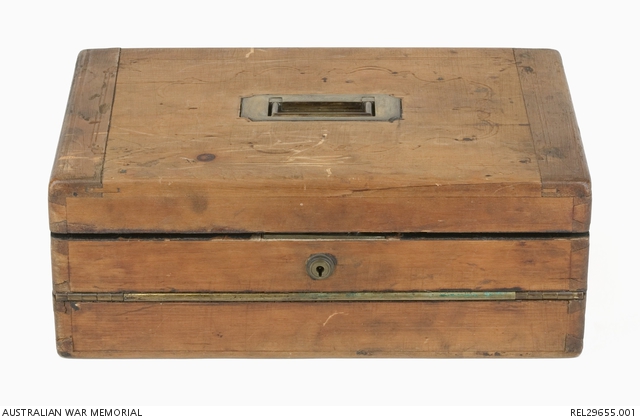| Places | |
|---|---|
| Accession Number | REL29655.001 |
| Collection type | Heraldry |
| Object type | Heraldry |
| Physical description | Brass, Leather, Wood |
| Maker |
J W & T Allen |
| Place made | United Kingdom: England, Greater London, London |
| Date made | c 1850s |
| Conflict |
New Zealand Wars, 1845-1872 British Army Era, 1788-1870 |
Writing desk : Captain H E W Preston, 50th (Queen's Own) Regiment of Foot





Compact portable timber writing desk with brass and black leather fittings. The timber appears to have been sanded to remove stain or varnish from its surface. A brass panel in the lid contains a lift-up handle and is engraved 'H.E.W. Preston Esqre' and '50th Regt'. There are the remains of a decorative embossed pattern on the lid surrounding the handle. The box has two compartments with internal lids and spaces for correspondence as well as a lift-out tray containing several compartments for writing implements and with removable boxes at each end that appear to be for ink and 'light'.
Henry Evelyn Woodville Preston obtained his commission (by purchase) as Ensign in the 50th (Queen's Own) Regiment of Foot on 9 November 1855. At that time his regiment was on active service in the Crimea. The 50th returned from these duties in August 1856, and embarked for Ceylon on 30 June 1857. In 1858 Preston qualified as regimental instructor of musketry, and on 11 February 1859 was promoted lieutenant.
In 1863 the 50th Foot was sent to New Zealand following the outbreak of further fighting with the Maoris. Preston was present with the regiment when it disembarked at Auckland on 15 November 1863, and it is further recorded that he was present during the assault and capture of Rhagiawhia on 21 February 1864.
Following service in New Zealand the 50th Regiment was sent to New South Wales to reinforce local defences. Preston accompanied his regiment and was stationed at Victoria Barracks, Sydney, for three years. The 50th Foot was the fourth Imperial regiment to occupy the Barracks. In 1869 the regiment returned to England and on 1 April 1870 Preston was promoted Captain and placed on half pay. In 1875 he was appointed to the 5th Northumberland Fusiliers, joining that regiment in India.
The following year he returned to England on account of his wife's ill health and retired from the Army by sale of his commission. He had completed over 20 years service. A handwritten account of Preston's life after leaving the Army states that, with his wife, he returned to Australia in 1877 with a view to obtaining employment in the local Defence Forces, but failed to gain a suitable appointment. In 1882 his wife died. In 1883 Preston was appointed a JP. He also sat on the bench of the Water Police Court for more than two years in an attempt to qualify for the position of a PM, but failed. He later unsuccessfully sought the position of resident magistrate of Norfolk Island, and of visiting magistrate of Lord Howe Island. Preston died in 1905, and is buried at Waverly Cemetery.
Related information
Related Objects
- Key to Writing Desk : Captain H E W Preston, 50th (Queen's Own) Regiment of Foot
- New Zealand Medal 1860-1866 : Lieutenant H E W Preston, 50th (Queen's Own) Regiment of Foot
- Shako plate 50th Regiment of Foot, British Army, 1861-1869 : Captain H E W Preston
- Officers Shako plate: 50th Regiment of Foot, British Army, 1861-1869 : Captain H E W Preston
- Whistle : Captain H E W Preston, 50th (Queen's Own) Regiment of Foot
- Card of five gilt Officers' mess dress buttons for the 5th Regiment of Foot (Northumberland Fusiliers) : Captain H E W Preston
- Card of six gilt Officers' mess dress buttons : Captain H E W Preston, 50th (Queen's Own) Regiment of Foot
- Four loose buttons of the 5th Regiment of Foot (Northumberland Fusiliers) : Captain H E W Preston
- Devonshire Regiment Brooch : Captain H E W Preston
- Bible and prayer book : Captain H E W Preston